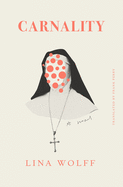
In the background and at the heart of Carnality, the bewitching third novel from Swedish author Lina Wolff (The Polyglot Lovers), is a sinister game show with which the novel shares its name. The show, accessible only on the dark web and hidden behind layers of paywalls and encryption, resembles a grotesque remix of Catholic confession for the reality TV era: a venue for the penitent to come clean before an online audience hungry for narratives of redemption--or ruin. Presiding over it all is a mysterious nun rumored to have both performed miracles and assisted in suicides, embodying Carnality's twin promise of absolution and doom.
The mechanics of Wolff's plot defy straightforward description, with lunatic tourists, stolen speedboats and black-market organ harvesters all coming into play. Wolff trades narrators and storytelling modes with a boldness that sharpens the exuberant contours of the novel: the first half is comprised largely of a monologue delivered by a man who blames Carnality and its evil nun for his undoing; the second half, in a thrilling turn, takes the form of the nun's memoirs. Wolff's narrative pyrotechnics might easily be mistaken for abandon, but as the ending--haunting, affecting and deeply satisfying--makes clear, Carnality's madcap energy is the product of sure-handed control. Meanwhile, evocative language suffuses the novel (a sweltering Madrid summer "lies heavy on the soil like an enemy that never tires"), a testament to the powers of both Wolff and translator Frank Perry to conjure sentences that demand to be reread and savored. --Theo Henderson, bookseller at Ravenna Third Place Books in Seattle, Wash.

